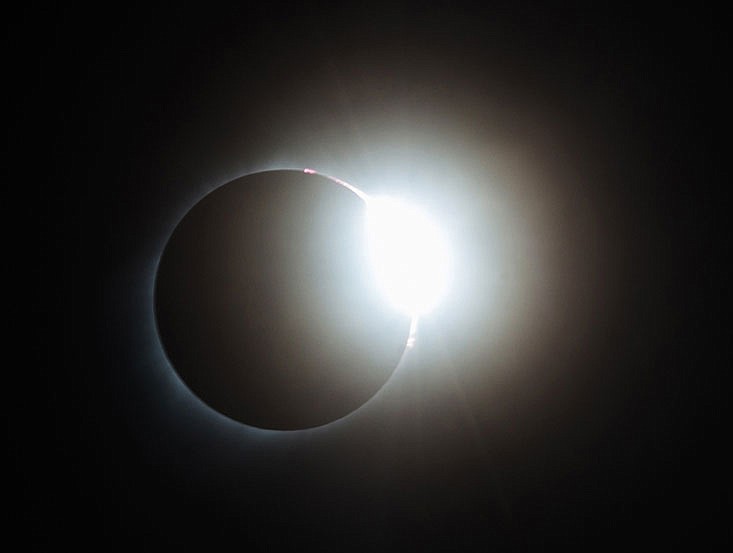They came from near. They came from far.
They came by train. And some even came by plane.
Thousands of stargazing tourists flocked to Jefferson City on Monday morning praying to the sun gods for clear skies to hold out ahead of expected late afternoon thunderstorms. After years of preparation by city officials and some attendees, revelers got their wish as Mother Nature treated Jefferson City to a fiery show unseen in this part of Missouri in 760 years.
Visitors from several states and abroad said Monday's rare total solar eclipse did not disappoint.
The Jefferson City Convention and Visitors Bureau said at least 25,000 people attended festivities Monday around Jefferson City.
About a half dozen amateur astronomers set up telescopes and cameras around 9 a.m. on a beat-up baseball field at the North Jefferson City Recreation Area, which served as the main campground for eclipse festivities. As totality approached and the sky grew darker around 1:13 p.m., viewers on the field went bonkers.
"Oh my goodness, we're getting close," said Richard Whorton, a retired band director from the Dallas suburb of Rowlett, Texas, seconds before the moon completely covered the sun.
"Jeff City did not disappoint," said Andrew Mitchell, of North Little Rock, Arkansas.
Viewing parties were held Monday at the Missouri State Capitol and at the North Jefferson City Recreation Area, where dozens of visitors camped overnight. Katherine Reed, communications manager for the CVB, estimated about 10,000 people were at the North Jefferson Recreation and 15,000 were at the Capitol.
The CVB previously estimated up to 50,000 visitors could come to Jefferson City and planned for the event for two years. Reed said more precise estimates would be available later after the CVB talks to hotel owners. She added that any time the city draws visitors to town, it's a good thing.
"We had no clue what to expect," Reed said Monday.
Totality crept in slowly as a partial eclipse began at 11:49 a.m. and the moon crept slowly across the sun's face until 1:13 p.m. Second by second, the sky gradually grew darker.
When totality finally hit, it enveloped the city suddenly in an eerie shadow and turned nature on its head. Cicadas and birds that had been chirping loudly throughout the early afternoon, suddenly grew quiet and left the wide open fields around the recreation in an eerie silence, pierced only by celebratory screams from revelers.
Totality lasted just 2 minutes, 29 seconds; but to the dozen or so people on the ball diamond, it felt like it lasted a lifetime. As the sun hovered behind the moon, it left a white hot halo streaking around its edges. Keen observers like Whorton noticed thrilling features about this phenomenon, called a corona.
"I can see a prominence in the lower right lobe," Whorton said as he pointed to a tiny sun spot that flared off the corona.
About 10 minutes after totality ended, with a partial eclipse still ongoing, Whorton packed up his telescope and set it in the back of his SUV, saying he was thrilled with how the day turned out.
Whorton, 64, drove 4 hours Monday morning from Tulsa, Oklahoma, where he and his adult son, Chris, spent the night Sunday. They decided to come to Jefferson City at the last minute, thinking the weather looked better than in Kansas City or St. Louis.
As Whorton focused his telescope Monday morning, a thick layer of clouds hung over the recreation area. Forecasts called for scattered afternoon thunderstorms that could begin as early as 2 p.m. When asked if he thought the clouds would clear, Whorton only said nervously, "I'm hoping."
Somehow, Fred Roetker, his teenage son, Drake, and his fiancée Gale Rabalais, also made it to the recreation area - even if Jefferson City wasn't their first destination. The Roetkers and Rabalais camped Sunday night and attended a brunch Monday morning in Marshall. Roetker considered coming to Jefferson City originally but decided on Marshall because the city allowed camping next to planes on a closed grass runway at the Marshall Memorial Municipal Airport.
As the partial eclipse began, though, Roetker and Rabalais called the Jefferson City Memorial Airport. At 12:15 p.m., they loaded up their propeller driven Beechcraft Bonanza aircraft and flew 57 miles from Marshall.
When Roetker exited the brunch in Marshall, he said, the weather looked stormy.
"We weren't sure about the weather," Roetker said. "I went immediately to the radar, looked at the radar and said, 'We need to go east.'"
"We still had the tent pitched, too, and had to throw it in the plane," Drake Roetker added.
As the partial eclipse began, Sita Ambatipudi and Praveen Gudipalli, of Phoenix, and Harish and Ramya Boddu, of St. Louis, cooled off in the shade at the recreation area. She and Gudipalli spent the weekend in St. Louis and saw the Gateway Arch.
Maria Petros, her husband, Kirk, and daughter, Isabella Wonders, came up from Groves, Texas. Petros said she'd planned this trip for three years. This was Petros' first time in Missouri, and they spent the weekend at a resort in Branson.
"We made a vacation out of it," Petros said. "There's a lot of stuff to do here besides the eclipse."
Reports of visitors from far-off countries like Italy and England floated among campers Monday morning.
Boris Sdromar traveled from Zagreb, Croatia, the country's capital. He saw his first total solar eclipse in Hungary in 1999. This was the fifth solar eclipse he's seen, and he's traveled to Turkey, Russia, Australia and now Jefferson City for the spectacle.
Around 12:30 p.m., with the partial eclipse well underway, Sdromar's daughter, Una, checked a thermometer in five-minute intervals. She said the temperature dropped by 8 degrees Celsius, or about 46 degrees Fahrenheit.
Sdromar said this eclipse lived up to the hype.
"This was really great," Sdromar said. "I saw a bright star right next to the sun."

